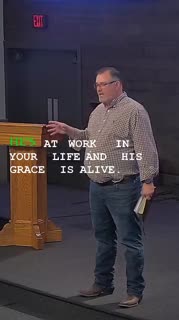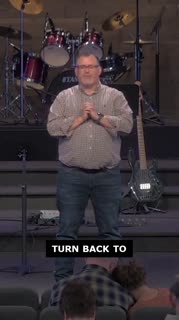God's Grace and the Battle Against Idolatry
Devotional
Sermon Summary
Bible Study Guide
Sermon Clips
"We're here to worship God. And we give what we have the best we can and the best of what we have. Who we are is what you hear. So if he ever lets me sing, I'm going to sound like Grandpa Grunt, but I'll do it the best I can. We're not striving for excellence in the sense that everything's got to be perfect. We're striving in excellence in the sense that you give what you have." [00:38:03] (26 seconds)
"Israel had turned away from God, even though they saw the promises. Can you imagine? I mean, I hope we get to see all that when we're in heaven. They experienced it. They experienced manna from heaven. Can you imagine? And yet here they've rejected God." [00:56:39] (18 seconds)
"That God wants your heart, not your stuff. That God wants your heart, not your situation. And He will do what it takes to draw you back, but you need to choose. Yes. It's got to be an act of the will, empowered by the Holy Spirit of God and the Word of God, of course, but you must choose to repent and follow God." [00:57:43] (21 seconds)
"He's at work in your life and his grace is alive. But Israel cried out to God, and God answered them. You see, God's grace is available and is always at work. Even while God is chastising Israel, that's a part of his grace because he's using their decisions and the results of their decisions to bring them back into relationship with him." [01:00:34] (24 seconds)
"Idolatry is this, anything that's more important to you than God, and anything you trust in more than you trust in God. In the nation of Israel, they were trusting, and these idols, even in the face of while they knew God had delivered them and prospered them and kept them and blessed them. They had forgotten God." [01:08:10] (26 seconds)
"And I'm asking you, won't you instead engage yourself in the cycle of God's grace and make God the most important? Let's pray. Lord, I pray that we would not displace you with stuff, things, people, feelings, situations, jobs, cars, guns, dogs, hunting, whatever it might be." [01:17:54] (29 seconds)
"And God, if there's any here today that do not know you as Savior, I pray that they would make you the most important by telling you, God, I will follow you. I will follow Jesus Christ. I will accept him as my Savior." [01:18:50] (14 seconds)
"that we would turn back to you, that we wouldn't put our trust in things, stuff, situations, money, politics, but that we would always, always, always place our trust in you. You're the great sovereign God of the universe." [01:21:30] (15 seconds)
Ask a question about this sermon
"Israel had turned away from God, even though they saw the promises. Can you imagine? I mean, I hope we get to see all that when we're in heaven. They experienced it. They experienced manna from heaven. Can you imagine? And yet here they've rejected God." [00:56:39] (18 seconds)
"That God wants your heart, not your stuff. That God wants your heart, not your situation. And He will do what it takes to draw you back, but you need to choose. Yes. It's got to be an act of the will, empowered by the Holy Spirit of God and the Word of God, of course, but you must choose to repent and follow God." [00:57:43] (21 seconds)
"He's at work in your life and his grace is alive. But Israel cried out to God, and God answered them. You see, God's grace is available and is always at work. Even while God is chastising Israel, that's a part of his grace because he's using their decisions and the results of their decisions to bring them back into relationship with him." [01:00:34] (24 seconds)
"Idolatry is this, anything that's more important to you than God, and anything you trust in more than you trust in God. In the nation of Israel, they were trusting, and these idols, even in the face of while they knew God had delivered them and prospered them and kept them and blessed them. They had forgotten God." [01:08:10] (26 seconds)
"And I'm asking you, won't you instead engage yourself in the cycle of God's grace and make God the most important? Let's pray. Lord, I pray that we would not displace you with stuff, things, people, feelings, situations, jobs, cars, guns, dogs, hunting, whatever it might be." [01:17:54] (29 seconds)
"And God, if there's any here today that do not know you as Savior, I pray that they would make you the most important by telling you, God, I will follow you. I will follow Jesus Christ. I will accept him as my Savior." [01:18:50] (14 seconds)
"that we would turn back to you, that we wouldn't put our trust in things, stuff, situations, money, politics, but that we would always, always, always place our trust in you. You're the great sovereign God of the universe." [01:21:30] (15 seconds)








